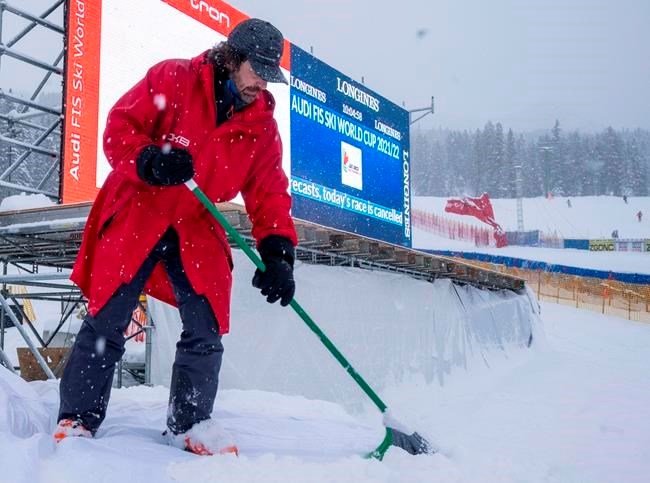LAKE LOUISE, Alta. — A three-race World Cup weekend turned into a one-race weekend in Lake Louise, Alta., with the cancellation of Sunday's men's super-G.
Heavy, wet snow continued to blanket the ski resort in Banff National Park and made grooming a 2.5-kilometre course in time for a noon start too onerous for volunteer course workers.
Friday's downhill was also cancelled because of too much snow. Saturday's downhill, won by Austria's Matthias Mayer, was the first of the 2021-22 season.
"It was Mother Nature two, Lake Louise World Cup one this weekend," race chairman Brian Lynam said Sunday.
Another 25 centimetres of snow was forecast for the national park by Monday on top of between 30 and 40 that had piled up over the three previous days.
Snowcats began working the course at 2 a.m. and course workers were on it 6 a.m. in an attempt to get the race in Sunday.
"We're a speed event," Lynam said. "It's just too much snow to move. It wouldn't matter how many cats we had or volunteers, especially on some of the steep pitches where we have to use winch cables."
The cancelled downhill in Canada was added to the program for the next World Cup in Beaver Creek, Colo., starting Friday.
Meanwhile, the world governing body of skiing said of 10 individuals involved in the race who initially tested positive for COVID-19, nine were determined to be false positives and not infected with the virus after they were put into isolation and re-tested.
"The FIS Task Force has determined that given only one individual tested positive with minimal secondary contact, the tour will move onto its next stop in Vail/Beaver Creek," FIS said in a statement.
"The individual who tested positive will stay in Canada and complete a mandatory 10-day quarantine according to local regulations."
The men got in a pair of training runs in Lake Louise earlier in the week, but a third was called off Thursday.
Lake Louise traditionally opens the international men's speed season and has been a regular Canadian stop on the circuit for almost three decades.
After its cancellation in 2020 because of the COVID-19 pandemic, the host men's team was excited to race on home snow again, particularly because a second downhill was added to the Lake Louise program this year.
A young team had better prospects in super-G than downhill with Toronto's Jack Crawford and Brodie Seger of Whistler, B.C. ranked in the top 30 in the discipline.
Crawford was the top Canadian in Saturday's downhill in 24th.
"It's always hard when a race gets cancelled," Crawford said. "We have to thank the course workers for trying so hard. It's always a shame when the weather is against them.
"Going to try to put this one behind us and move into Beaver Creek with a fresh mindset."
Lake Louise's men's races in 2016 were cancelled because temperatures were too warm to make snow, but the women's event went ahead the following week.
The women arrive in Alberta for two downhills and a super-G with the first training run scheduled for Tuesday.
"We turn our focus on the women's week," Lynam said. "The crews have already pivoted to focus on that.
"We need to make sure now we protect the track as much as possible. There's only so many things you can do when it's snowing."
The volunteer course workers are known as "sled dogs" at Lake Louise. The COVID-19 pandemic didn't decrease volunteerism this year, Lynam said.
"Inside and outside the fences . . . we have about 250 volunteers," he said. "Our requirements were all our volunteers be fully vaccinated."
"We got the numbers back that we had hoped for and planned for and they were all able to show up too."
Canada will field a two-woman team in Lake Louise of Marie-Michele Gagnon of Lac-Etchemin, Que., and Roni Remi of Collingwood, Ont.,
A two-time World Cup medallist in slalom, the 32-year-old Gagnon earned her first medal in speed event last season when she finished third in a super-G in Germany.
This report by The Canadian Press was first published Nov. 28, 2021.
Donna Spencer, The Canadian Press


